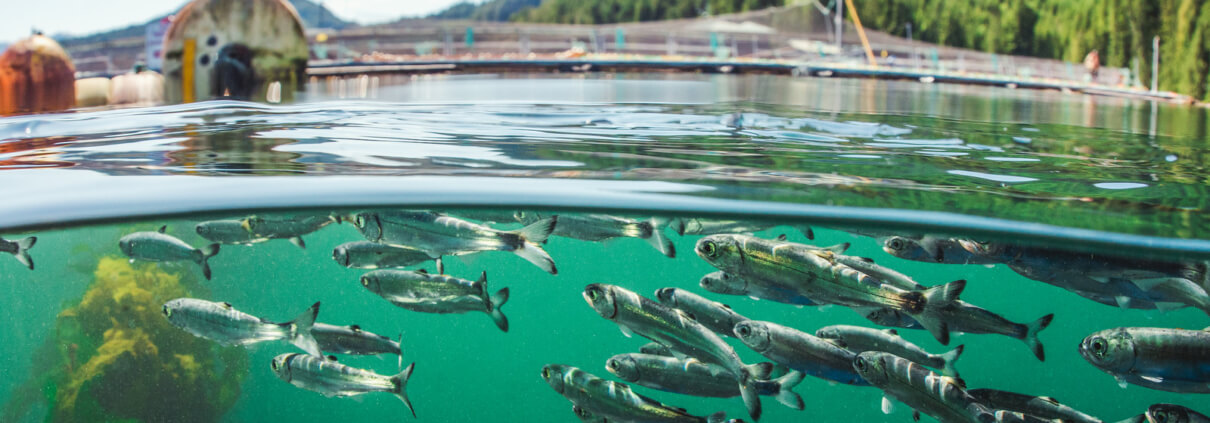Statement to Standing Committee on Fisheries and Oceans (FOPO): Open-net salmon farming in B.C.
The Pacific Salmon Foundation was invited to present at the recent Government of Canada Standing Committee on Fisheries and Oceans (FOPO). Pacific Salmon Foundation scientists Drs. Andrew Bateman and Brian Riddell provided the following statement on aquaculture to the committee.
Brian Riddell & Andrew Bateman (speaker) – opening statement
On behalf of Dr. Brian Riddell and myself, thank you Mr chair & committee members for inviting the Pacific Salmon Foundation to speak. For 35 years PSF has worked to sustain and rebuild Pacific salmon, and Dr. Riddell and I combined have studied salmon for over 60 years.
The importance of accurate and comprehensive science advice to decision-makers – and the consequences of failure to provide such advice – are not new topics. In 1997, the late Dr. Jeffery Hutchings and others detailed DFO’s related failings in the collapse of Canada’s Atlantic cod fishery. Thereafter, in 1999, the federal government developed the SAGE principles to support “sound science and technology advice,” and for years DFO has used science review processes – CSAS and its predecessor PSARC – to advise decision-makers.
DFO’s current science-advice aims are laudable on paper, but principles and guidelines are only as good as their implementation.
Dr. Riddell’s and my recent involvement concerns open-net salmon farming in BC. In 2018, an expert panel convened by Canada’s Chief Science Advisor delivered recommendations to DFO for improving use, generation, and communication of science in aquaculture decision-making. Recommendations included establishment of an external advisory committee. Based on our experience, we would suggest taking this a step further: science advice itself should be collated, assessed, and delivered by an independent body of experts.
To illustrate pitfalls of the current approach, I’ll discuss the CSAS risk assessments that stemmed from the Cohen Commission, gauging risk to Fraser River sockeye salmon due to pathogens from Discovery Island salmon farms. We submit that these assessments revealed DFO’s overreliance on the CSAS process, failing to uphold the principles of comprehensive, open, peer-reviewed, and independent science advice and conflating “good on paper” with “good in practice.”
As participants in four of the nine Discovery Island risk assessments, we can testify:
- The findings of minimal risk reflect neither the current state of knowledge nor true scientific consensus.
- KEY risks were omitted – sea lice, cumulative effects, and the conservation status of the sockeye stocks were ignored.
- The processes were neither unbiased nor independent:
- the risk assessments were implemented, closely managed, and influenced by senior officials from DFO Aquaculture, and
- employees, contractors, and others linked to the salmon farming industry served on the steering committee and as senior reviewers, so that conflict of interest threatened the integrity of the process.
More generally, “consensus” is held up as a strength of CSAS, but meetings apply strong social pressure on dissenting voices, creating the perfect conditions for “group think,” and there is no mechanism for errors to be addressed once the “consensus” box has been ticked. Further, some international participants abstain from consensus votes, reducing the influence of international perspectives. In any case, consensus is NOT a requirement of the scientific process, and the practice of minimising real disagreement does a disservice to decision-makers and flies in the face of the SAGE guidelines, which state that “decision-makers should consider the multiple viewpoints received,” not just the distilled version of “uncertainty” used in practice.
Even ignoring problems with the CSAS process itself, we’ve seen CSAS findings misrepresented by some within DFO. In the case of the sockeye risk assessments, findings have been used to argue that BC salmon farming poses “no more than a minimal risk” to wild salmon. This is absolutely not what the CSAS studies found, being highly specific to the risks from Discovery Islands farms to Fraser River sockeye salmon alone. Perhaps even worse is that CSAS advice, while supposedly subject to revision “as new and relevant information becomes available,” is commonly used as rationale to ignore new findings.
While CSAS review works well at the best of times, it is not the best of times at which decision-makers need the best advice. A good system can be undermined by human foibles, and although CSAS addresses some of the issues raised by Dr Hutchings and others 25 years ago, Canada can do better.
Science evolves, issues evolve, and science advice needs to evolve.
In conclusion, we need to fix the current CSAS process, run by DFO and entwined with the management preferences, influences, and aspirations of the Department. Based on our considerable professional experience, Dr. Riddell and I reiterate that Canada should implement a truly independent science advice body, to directly advise decision makers and recommend further research without being subject to vested interests inside or outside DFO. In addition to many international examples, COSEWIC provides a useful, trusted example in the modern Canadian context. A similar body for fisheries advice could adopt the best features of CSAS, while avoiding many of its failings. On the aquaculture front, such a body could go a long way towards restoring trust that many Canadians have lost in the Department.
To watch the entire April 27 proceedings, click here.



